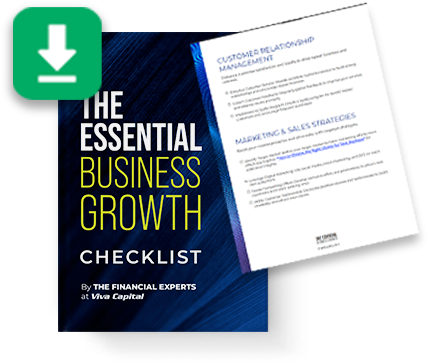
Are you trying to establish a future-proof business with enough financial security to withstand whatever might come your way? With the uncertain landscape and so many changes in recent years, from increased expenses to switching products and services to meet changing client demands, it’s no wonder that people are trying to figure out how to manage small business finances better. Whether your business has been around for a while or you’re just starting, future-proofing your business is of the utmost importance.
On this page, we’ll walk you through some of the basics of managing small business finances, helping you stay ahead and ensure your business reaches its full potential. We’ll discuss the importance of cash flow, the need to invest in your employees, and the proactive approach to risk and accounting for the long-term success of your business. Diversifying, being able to negotiate, and adopting new technology are just a few tips that can help reduce future problems, attract new customers, and save money in the long run. By closely examining your business’s strategies, you’ll be in a stronger position to build resilience and foster customer loyalty. This will also help your company prepare for unexpected challenges, ensuring it remains competitive in your industry.
Understand How the Economy Affects Your Industry
You’ve probably heard that the economy can impact customer growth, supply chain, and even your access to business credit. This is true, but it’s not so clear-cut.
For instance, businesses of a cyclical nature that tend to depend on discretionary spending are often hit the hardest regarding revenue. This includes industries such as travel and leisure. Meanwhile, basic needs such as groceries and healthcare typically escape significant hardships during an economic downturn.
Explore how shifts in the economy have historically impacted your industry and niche to identify ways your business will likely be affected in the future. From there, you can develop plans to address likely scenarios.
Analyze Past Performance
Understanding past performance in times of turmoil and under normal situations can also help you minimize the impact of adverse conditions. A few areas to evaluate are covered below.
- Financial History: Identify your key financial metrics and evaluate performance. Use the information gained to create more accurate models when forecasting your cash flow now and in the future to manage business finances better.
- Client Satisfaction: Examine historic client satisfaction rates and what has kept clients happy to help improve retention going forward.
- Employee Satisfaction and Performance: Evaluate how employees have behaved and felt. That way, you can take steps to support them and keep morale high despite changing conditions.
- Sales and Marketing Performance: Many businesses see shifts in the types of products or services that appeal to their clients when the economy shifts. Knowing how people react to yours in advance can help you pivot faster when needed.
- Competitors: Are your competitors utilizing any strategies that help them maximize positive shifts or reduce the impact of adverse changes?
Listen to Your Customers
Half of all businesses fail within the first five years, and 42 percent cite a lack of market demand, according to Forbes. Remember that your clients speak through both their actions and words. To gauge client interest, draw on data, such as sales or time spent on specific website pages. Also, consider polling clients to better understand their preferences, interests, and experiences with your brand. You can use this data to improve retention, increase spending, and anticipate future needs and wants.
Master Vendor Management
As a small business, you may only work with one supplier in each area. That’s good for building relationships, but it’s not necessarily great if their ability to fulfill your needs diminishes in the future or if you’re not getting the best deal possible.
Always get offers from competing vendors to improve your negotiating power and keep costs low. Whenever possible, order from more than one supplier to build additional relationships that you can leverage in the event of a supply chain disruption later.
Diversify Your Revenue Streams
You’ve probably heard, “Don’t put all your eggs in one basket.” This rings true with your revenue streams if you’re trying to future-proof your business finances, too.
Start by exploring your current offerings to see if you can make minor adjustments to create an additional revenue stream. For instance, can you bundle more services or break services apart? Can you offer something that complements your existing services or turn what you’re doing into a subscription-based service to create more stable recurring revenue?
It’s also helpful to look into referral programs and whether you can earn bonuses for sending your clients to other businesses you know and trust. Some companies also leverage affiliate marketing but consider how this might impact your business branding and conversions before moving forward.
Cut Back on Your Expenses
More than a third of small businesses that fail within the first five years run out of capital, according to Forbes. Managing your vendor relationships well is one way to save money in business. You can also look at ways to save on taxes, reduce labor, and eliminate unnecessary or redundant subscriptions.
Keep Debt to a Minimum
One of the biggest small business financing tips that often gets overlooked is the avoidance of debt. While some debt isn’t bad and can help you build credit or expand, other debts, such as credit cards and merchant lines of credit, can quickly become debt traps that become difficult to pay off and very expensive over time. Plus, the more debt you have, the less likely you are to qualify for traditional loans or get favorable terms. For these reasons, it’s still a good idea to keep debt to a minimum even when business performance is good and you’re feeling optimistic about the future.
One of the best ways to future-proof your business finances is to explore industry-specific funding options. In construction, general contractor financing solutions like Viva’s Construction Quick Pay Program allow contractors to ensure smooth cash flow, even during economic uncertainty. This not only helps with managing subcontractor payments but also boosts overall project efficiency.
It’s worth noting that you can still get funding for growth and other needs without going into debt. For instance, invoice factoring can provide upfront cash for your B2B invoices. When you work with an invoice factoring company like Viva, you sell your invoices at a discount. Your clients clear the balance when they pay their invoice, so there’s nothing for your business to pay back.
For high-growth businesses that need capital without diluting equity, venture debt financing—offered by specialized lenders— can be a strategic alternative to traditional bank loans, balancing access to funds with manageable repayment structures.
Create an Emergency Fund
Often referred to as “capital reserves” or “retained earnings,” your emergency fund can help you weather whatever comes your way without seeking external funding. A good goal for most business owners is six months of expenses. This includes everything from payroll to office supplies and rent. Most small businesses can’t afford to build an emergency fund all at once or even in a short period, especially if they’re already paying down debt. However, you should be putting some money toward your fund regularly until you hit your goal.
Leverage Technology and Agile Methodologies
We talked a bit about running lean in terms of cutting costs earlier. Leveraging the right technology and agile methodologies are part of this. For instance, you can use software to automate your invoicing process and save hours every week. You can also outsource some of your business processes. If you’re working with a factoring company like Viva, our accounts receivables experts will handle your collections.
Future-Proof Your Business Finances with Invoice Factoring
Whether you’re trying to minimize your debt, need funding to cope with an issue, or are trying to run leaner, invoice factoring can help. Request a free Viva rate quote to learn more or get started.
- How Subcontractor Early Payment Programs Build Relationships - May 29, 2025
- Invoice Factoring Costs: Are They Worth It? - May 2, 2025
- 7 Proactive Tactics for Avoiding Invoice Disputes - March 3, 2025



